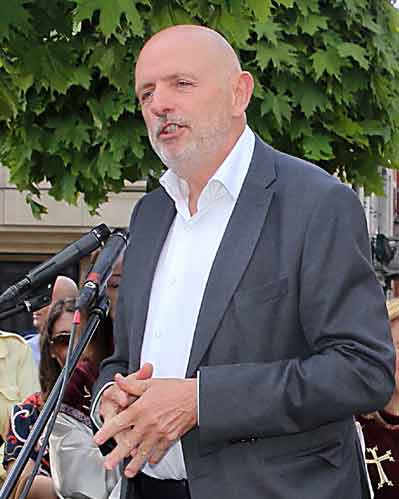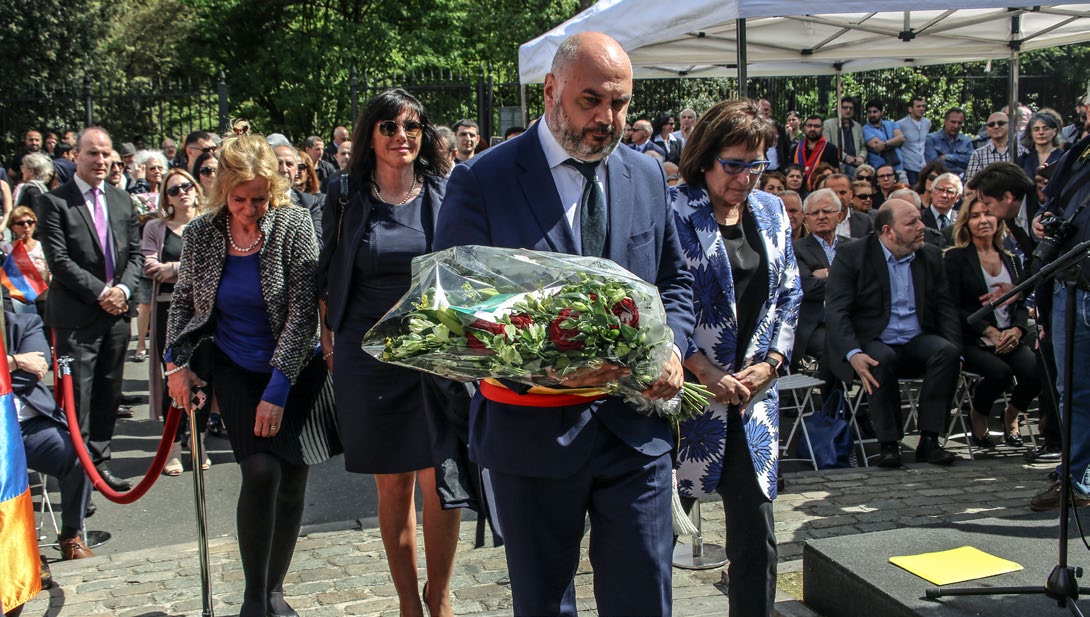A controversy arose in Belgium just days before this year’s April 24 commemorations on a proposed ban on the denial of mass crimes.
The controversy centered on the scheduled adoption, on April 24, of legislation to prohibit the denial of genocides, war crimes and crimes against humanity. The draft law was controversial in that it effectively excluded from its scope such crimes as the Armenian genocide of 1915 and the genocides committed during the following years on the Arameans/Assyrians and the Pontic Greeks of the Ottoman empire.
A controversial proposal
Several Members of the Belgian Parliament protested the draft law. Among them, the Christian Democrat Georges Dallemagne stated the obvious: «We can either allow the freedom to deny all genocides, or ban their denial, but we must put all these crimes on the same footing”
In his editorial of the newspaper La Libre, Dorian de Meeûs recalled that the Belgian Parliament and government had both formally recognized the Armenian genocide and added : «the contradiction between this proposal and Parliament’s own positions on the subject reveals the pernicious influence of communitarianism on elected representatives and on their parties, who court Belgium’s Turkish electorate”.
In a joint statement, Armenian, Aramean/Assyrian and Pontic Greek organisations demanded that the proposal be amended before adoption, arguing that “whereas the denial of mass crimes is customarily part of the discourse of pernicious political forces whose influence is however limited, the denial of the Genocide of 1915, by contrast, is part of the official discourse of the Turkish state itself and of the majority of its Belgian diaspora. It is thus all the more dangerous to society and to public order”.
Even Armenia’s prime minister Nikol Pashinyan joined the fray and requested in an appeal published immediately after the April 24 ceremony in Yerevan, Armenia, that « the Belgian Parliament be consistent and include the Armenian genocide in the law against genocide denial”.
In a vigorous and unexpected debate on the subject, the parties in Belgium’s governing coalition showed diverging approaches. In the end, however, the government held to its position, the Chamber of Representatives rejected all proposed amendments and the law was adopted on April 25(1).
It all started with the EU’s Framework Decision on Racism and Xenophobia
This piece of legislation is in fact the transposition into Belgian law of EU legislation against racism and xenophobia as well as of a Council of Europe convention on cybercrime. Both of these texts required the prosecution of denialism as part of the fight against hate speech in the public domain, and particularly online.
The EU Framework Convention on Racism and Xenophobia of 2008, in particular, requires Member States to prosecute hate speech in general, but singles out the denial of mass crimes for specific treatment, to the extent that they can be considered a form of hate speech(2). The crimes the denial of which would be prohibited under this piece of EU law would include genocides as well as crimes against humanity and war crimes.
This is a very different piece of legislation from those laws which ban the denial of the holocaust in many European countries however. The restriction on free speech is indeed limited to those cases where “the conduct is carried out in a manner likely to incite to violence or hatred against” the targeted group.
The EU law also allows Member States to further restrict the scope of its legislation. Indeed, controversially,
“any Member State may […] make a statement that it will make punishable the act of denying or grossly trivialising the crimes [of condoning, denying or grossly trivialising mass crimes] only if the crimes referred to in these paragraphs have been established by a final decision of a national court of this Member State and/or an international court, or by a final decision of an international court only.”
In formulating its legal proposal, the outgoing Belgian government thus chose to exercise this option and to limit the relevant mass crimes only to those that have been recognized by an international court.
The Belgian government did not explain its decision to apply this restriction. The most likely explanation however is expediency. This piece of legislation was adopted on the very last day of the legislature of the outgoing Parliament, a month to the day before the country’s general elections, but also 11 years after the adoption of the EU’s Framework Decision. The outgoing government was most likely tying up some loose ends before the end of its mandate. It likely chose to exclude the Armenian genocide from the law to avoid upsetting the sizeable Turkish electorate in Belgium, where community associations and institutions are essentially under the influence of the current Turkish government.
The rest of Europe
This Framework Decision is the European Union’s central piece of legislation addressing Racism and Xenophobia. Until 2014, its transposition into national legislation was up to the good will of the individual Member States as the European Commission had no enforcement powers. This changed in 2014 however, and the Commission commissioned a study at the time to review the extent to which Member States had indeed complied the FD (4).
Overall, it turns out that by 2014, 15 Member States had complied, partially or fully, with the requirement to prohibit the condoning, trivialization or denial of mass crimes other than those committed by the Nazis (5), while thirteen had not (6).
Of those that did implement this provision, seven (FR, CY, LT, LU, MT, RO and SK) had chosen to limit the scope of the prohibition only to those crimes recognized by a national or an international court, while the other 8 had not.
It is important to underline, however, that this study dates back to 2014, and that the precise state of implementation of this legislation Europe-wide today is unclear.
Free Speech, Hate Speech and Genocide Denial
Legislation banning genocide denial has long been controversial as courts and legislators have tried to balance the protection of free speech against the protection from hate speech. While the idea of banning hate speech as such has now gained widespread acceptance in Europe, the inclusion of genocide denial in the concept had not, at least until the EU Framework Decision was adopted. Furthermore, while this piece of legislation endorses the notion of banning the denial of mass crimes, it is not a complete ban on such denials as it limits this prohibition to those cases which are “likely to incite to violence or hatred”. In practice, it seems that its meaning will depend very much on the interpretation by the courts of the supposed intent of denialist discourse.
As far as the denial of the Armenian genocide is concerned, the best publicised legal dispute on the matter is the 2015 European Court of Human Rights case “Perincek vs Switzerland”. Perincek, a Turkish politician, travelled to Switzerland to deny the Armenian genocide and called the event a “great international lie”. He was condemned for this by a Swiss court, on the basis of legislation punishing hate speech. However, the ECHR eventually struck down this condemnation on the grounds that, though his facts may be wrong, the defendant had not in fact expressed contempt or hatred for the victims and was therefore not guilty of a form of hate speech.
Genocide denial and intimidation continue
There is no doubt that this field of work will continue to evolve. The debate is not being determined only by legal or principled considerations however. The Turkish government has indeed played a major role at all levels in shaping this field of legislation, from the formulation of the EU Framework Decision to that of the Belgian law adopted on April 25.
Meanwhile, events in the rest of Europe demonstrated that the denial of the Armenian genocide continues to cause tension.
On April 24, Armenian Genocide Remembrance Day, the Turkish President, Mr Erdoğan, said that what happened to Armenians in the early 20th century was “reasonable” at the time: “the relocation of the Armenian gangs and their supporters, who massacred Muslim people, including women and children, in eastern Anatolia, was the most reasonable action that could be taken in such a period”. Erdogan also lashed out against France’s decision to institute April 24 as an official day of commemoration of the Armenian Genocide.
In Istanbul, the commemorations of the Armenian Genocide were all but banned, for the first time since they began, in 2010. There were incidents elsewhere, too. In Stuttgart, Germany, a bomb threat caused the 24 April commemorations to be cancelled (7), while in Tbilissi, Georgia, the Armenian community was prevented from holding its traditional commemoration by an event the Turkish Embassy unexpectedly held in the same location (8).
Notes
(1) Belgium’s new law on the denial of mass crimes
(3) The EU’s policy and Framework Decision on Racism and Xenophobia
(4) Report from the Commission to the European Parliament and the Council on the implementation of Council Framework Decision 2008/913/JHA on combating certain forms and expressions of racism and xenophobia by means of criminal law
(5) BG, HR, CY, LU, LT, MT, SI, SK, ES, FR, IT, PL, PT, LV and RO
(6) BE, CZ, DK, DE, EE, EL, IE, HU, NL, AT, FI, SE and UK
(8) https://hetq.am/en/article/103199



